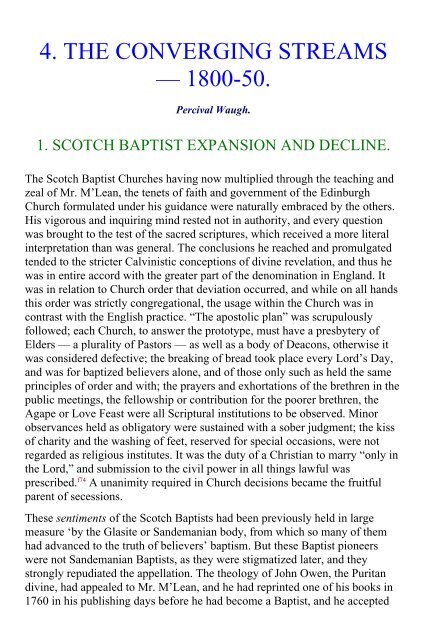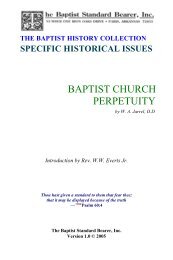Yuille - History of the Baptists in Scotland - Landmark Baptist
Yuille - History of the Baptists in Scotland - Landmark Baptist
Yuille - History of the Baptists in Scotland - Landmark Baptist
Create successful ePaper yourself
Turn your PDF publications into a flip-book with our unique Google optimized e-Paper software.
4. THE CONVERGING STREAMS<br />
— 1800-50.<br />
Percival Waugh.<br />
1. SCOTCH BAPTIST EXPANSION AND DECLINE.<br />
The Scotch <strong>Baptist</strong> Churches hav<strong>in</strong>g now multiplied through <strong>the</strong> teach<strong>in</strong>g and<br />
zeal <strong>of</strong> Mr. M’Lean, <strong>the</strong> tenets <strong>of</strong> faith and government <strong>of</strong> <strong>the</strong> Ed<strong>in</strong>burgh<br />
Church formulated under his guidance were naturally embraced by <strong>the</strong> o<strong>the</strong>rs.<br />
His vigorous and <strong>in</strong>quir<strong>in</strong>g m<strong>in</strong>d rested not <strong>in</strong> authority, and every question<br />
was brought to <strong>the</strong> test <strong>of</strong> <strong>the</strong> sacred scriptures, which received a more literal<br />
<strong>in</strong>terpretation than was general. The conclusions he reached and promulgated<br />
tended to <strong>the</strong> stricter Calv<strong>in</strong>istic conceptions <strong>of</strong> div<strong>in</strong>e revelation, and thus he<br />
was <strong>in</strong> entire accord with <strong>the</strong> greater part <strong>of</strong> <strong>the</strong> denom<strong>in</strong>ation <strong>in</strong> England. It<br />
was <strong>in</strong> relation to Church order that deviation occurred, and while on all hands<br />
this order was strictly congregational, <strong>the</strong> usage with<strong>in</strong> <strong>the</strong> Church was <strong>in</strong><br />
contrast with <strong>the</strong> English practice. “The apostolic plan” was scrupulously<br />
followed; each Church, to answer <strong>the</strong> prototype, must have a presbytery <strong>of</strong><br />
Elders — a plurality <strong>of</strong> Pastors — as well as a body <strong>of</strong> Deacons, o<strong>the</strong>rwise it<br />
was considered defective; <strong>the</strong> break<strong>in</strong>g <strong>of</strong> bread took place every Lord’s Day,<br />
and was for baptized believers alone, and <strong>of</strong> those only such as held <strong>the</strong> same<br />
pr<strong>in</strong>ciples <strong>of</strong> order and with; <strong>the</strong> prayers and exhortations <strong>of</strong> <strong>the</strong> brethren <strong>in</strong> <strong>the</strong><br />
public meet<strong>in</strong>gs, <strong>the</strong> fellowship or contribution for <strong>the</strong> poorer brethren, <strong>the</strong><br />
Agape or Love Feast were all Scriptural <strong>in</strong>stitutions to be observed. M<strong>in</strong>or<br />
observances held as obligatory were susta<strong>in</strong>ed with a sober judgment; <strong>the</strong> kiss<br />
<strong>of</strong> charity and <strong>the</strong> wash<strong>in</strong>g <strong>of</strong> feet, reserved for special occasions, were not<br />
regarded as religious <strong>in</strong>stitutes. It was <strong>the</strong> duty <strong>of</strong> a Christian to marry “only <strong>in</strong><br />
<strong>the</strong> Lord,” and submission to <strong>the</strong> civil power <strong>in</strong> all th<strong>in</strong>gs lawful was<br />
prescribed. f74 A unanimity required <strong>in</strong> Church decisions became <strong>the</strong> fruitful<br />
parent <strong>of</strong> secessions.<br />
These sentiments <strong>of</strong> <strong>the</strong> Scotch <strong><strong>Baptist</strong>s</strong> had been previously held <strong>in</strong> large<br />
measure ‘by <strong>the</strong> Glasite or Sandemanian body, from which so many <strong>of</strong> <strong>the</strong>m<br />
had advanced to <strong>the</strong> truth <strong>of</strong> believers’ baptism. But <strong>the</strong>se <strong>Baptist</strong> pioneers<br />
were not Sandemanian <strong><strong>Baptist</strong>s</strong>, as <strong>the</strong>y were stigmatized later, and <strong>the</strong>y<br />
strongly repudiated <strong>the</strong> appellation. The <strong>the</strong>ology <strong>of</strong> John Owen, <strong>the</strong> Puritan<br />
div<strong>in</strong>e, had appealed to Mr. M’Lean, and he had repr<strong>in</strong>ted one <strong>of</strong> his books <strong>in</strong><br />
1760 <strong>in</strong> his publish<strong>in</strong>g days before he had become a <strong>Baptist</strong>, and he accepted






